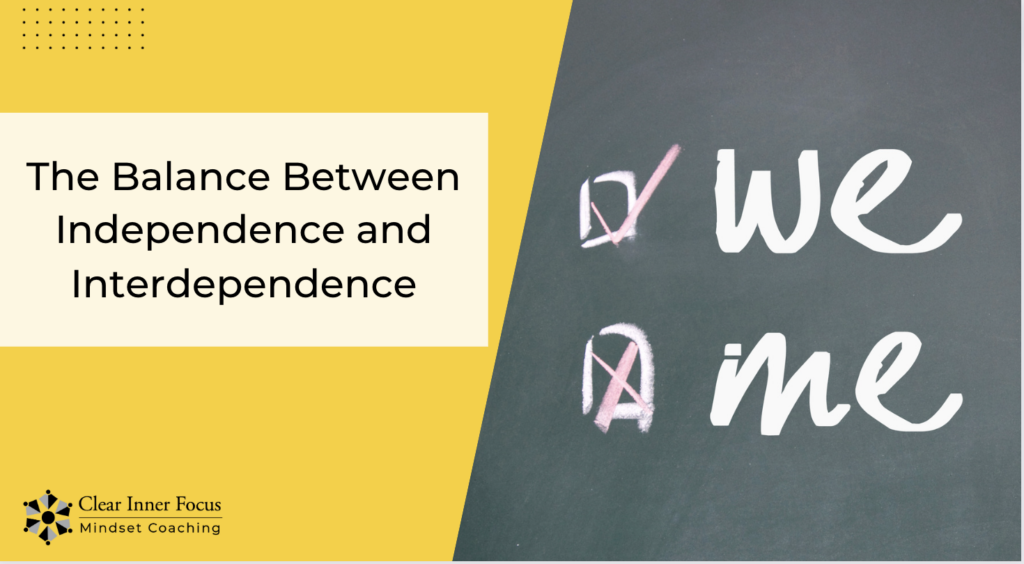
Self-Reliance:
Finding The Balance Between Independence and Interdependence
In today’s interconnected world, the importance of building strong, supportive relationships and relying on others cannot be denied. However, there’s an equally crucial aspect of personal growth that often goes overlooked: self-reliance. Learning to lean on yourself, rather than depending too heavily on others, can be a transformative journey that enhances your confidence, resilience, and overall well-being.
Life is a delicate balance between independence and interdependence. While having a supportive network of friends, family, and colleagues is invaluable, it’s equally vital to cultivate self-reliance.
Here are the benefits of developing self-reliance, along with the challenges that come with it and their corresponding solutions.
1. Boosted Confidence
Self-reliance cultivates self-confidence. When you trust in your abilities and judgment, your self-esteem soars. Relying on yourself helps you develop the skills and mindset necessary to tackle challenges head-on. With each successful endeavor, your confidence grows, making you more self-assured in all aspects of life.
Challenge: Setbacks –
Not every step forward leads to success. It is important to have strategies in place and implement them to support you when your efforts have not yet produced the desired results.
Solution: Set and Persevere in Pursuing Goals –
Establish clear goals for yourself and use them as a blueprint to guide your actions. By consistently taking steps towards achieving these goals, you will foster a sense of purpose and self-assurance.
2. Increased Resilience
The ability to lean on yourself in difficult times is a hallmark of resilience. Life is filled with setbacks and adversity, and knowing you can count on your own inner strength is a priceless asset. Developing self-reliance equips you to bounce back from life’s curveballs with determination and perseverance.
Challenge: Attentive Time and Strategy Dedicated to Regaining Focus after Setbacks –
The ability to lean on yourself is a skill. It requires bold new actions, mistakes refocus, and practice to make your optimal habits your strongest ones.
Solution: Learn from Mistakes –
Embrace failure as a stepping stone to success. Analyze your mistakes, learn from them, and use that knowledge to grow.
3. Personal Growth
Self-reliance is an essential component of personal growth. When you rely on yourself, you open the door to self-discovery and continuous improvement. You’re more likely to take on challenges, learn new skills, and set ambitious goals. This journey of self-improvement fosters a sense of fulfillment and purpose.
Challenge: Holding Yourself Accountable:
Committed decisions are important. They require having a realistic, clear goal infused with your reasons why you want to achieve them. Without a committed decision, it is easy to tell yourself you are going to do one thing and then let yourself down.
Solution – Build Self-Trust:
Infuse your goals with the reason why you want them. Revisit your goals so you can make decisions accordingly. Make and keep promises to yourself. The more you trust in your ability to follow through, the more self-reliant you become.
“Make a decision and then make it the right decision.”
4. Reduced Stress and Anxiety
Leaning too heavily on others for emotional or practical support can lead to stress and anxiety. Self-reliance empowers you to handle day-to-day challenges and emotional difficulties with greater ease. Knowing that you can depend on yourself can significantly reduce the burden on your support network.
Challenge: Relying too Heavily on Others Ideas and Opinions
Excessively relying on external sources for guidance can diminish your capacity to turn inward, potentially leaving you with an overwhelming dependence on others. When these external sources are unable to provide what you seek, you might experience an even greater sense of isolation or engage in blaming and fault-finding behaviors.
Solution: Seek Professional Knowledge and Skills:
Continuously acquire knowledge and develop new skills. The more you know and can do, the more capable you become.
5. Independence
Self-reliance allows for greater independence. While depending on others is essential in some situations, the ability to manage your life and make decisions independently is liberating. It gives you a sense of control over your own destiny.
Challenge: Fear of Being Alone
Connection is a fundamental human need. You can seek connection with others out of neediness or from a place of personal strength and empowerment. The latter requires self-awareness and self-care strategies. When faced with difficulties, relying solely on doing more to gain a sense of value can lead to diminishing returns and a dependency on validation from others.
Solution: Slow Down and Gradually Build New Habits
Make the decision to set aside time to become curious and more aware of yourself. It is important to approach this process from a positive or neutral perspective. Consider working with others to help reduce self-criticism.
Conclusion
While there’s undeniable value in leaning on others for support and collaboration, the ability to rely on yourself is a foundational aspect of personal growth and well-being. Cultivating self-reliance boosts confidence, resilience, and independence, and it empowers you to embrace life’s challenges with a sense of purpose and determination. Striking a balance between leaning on others and leaning on yourself is key to leading a fulfilling and harmonious life.
